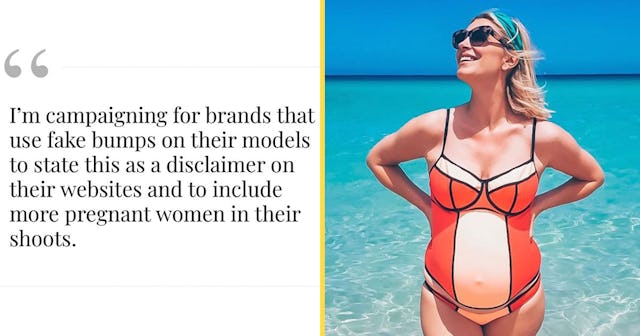We Need More Honesty In Maternity Advertising

Shopping for clothes can be a trying experience, to say the least. But when you’re pregnant, it becomes damn near impossible. While plenty of major retailers sell maternity clothing, finding the brands that fit is the challenge.
For many pregnant folks, shopping online for maternity clothes is pretty much the norm now. But there’s a hidden secret in the maternity clothing industry that women may not realize — many clothing companies use models with fake bumps to advertise their clothing.
And one woman is trying to change that. Louise Boyce, a model and mother based in England, is starting a revolution. Creating the hashtag #PushItOut, she is trying to create transparency in maternity advertising.
“I’ve always been aware that these fake bumps are used within the maternity fashion industry,” Louise Boyce explained to Scary Mommy. As someone who has been modeling for much of her life, she says she considered the practice “normal.” What she didn’t know, though, was that consumers were largely unaware of this fact.
“I’m campaigning for brands who use fake bumps on their models to state this as a disclaimer on their websites. Shoppers want transparency, and it is important that the bodies of real women are represented across the retail sector,” reads a portion of the petition Boyce has started.
There is no official reason why companies use fake bumps in their advertising. It could be due to working hours — pregnant women may get more tired from standing for so long. But it’s probably because you can manipulate the imagery if you’re slapping a fake bump on a regular model.
“When I became pregnant with my first child 7 years ago, I expected maternity modeling work to knock at my door,” she said. But in reality, things were much different. “My agency at the time told me my career was over and I should look elsewhere for work.”
She’s currently pregnant with her third child and things haven’t changed all that much. In February, she shared a picture of her bump on Instagram explaining that she was technically on maternity leave. Even though she was only 17 weeks pregnant at the time, her bump was too big for her “regular” clients. And she said companies don’t usually hire pregnant models larger than a UK size 10.
Boyce explained that the fashion industry has evolved so much when it comes to main fashion campaigns using such model diversity, whether it’s body shape, ethnicity, or ability — yet maternity is stuck in the dark ages, and only uses a certain size.
A plus size model herself, Louise Boyce has spoken openly about her struggles with an eating disorder. Even though she is very confident about her own body, those negative thoughts don’t just disappear. One of her biggest issues with the fake bumps is that they perpetuate unrealistic expectations for women’s bodies.
“It upsets me to think other pregnant women who are body conscious are getting depressed when shopping because they can’t relate to the models, and start questioning their own baby bump when it’s perfect,” Boyce said.
Pregnant bodies are all different. That’s the beauty of being pregnant. But there is still a lot of anxiety surrounding your changing body. We are constantly being fed images of women with perky bellies and slim bodies. And yes, there are women who look like that when they’re pregnant. But more often than not, women’s bodies change all over. Your butt droops, your hips widen, and forget about your breasts. Your body is growing to accommodate the person you’re growing.
“Real bumps come in all different shapes and sizes and rather than celebrating this, the retail sector seems to be ignorant to the pressures women feel to look a certain way while their bodies are undergoing an enormous physical transformation,” Boyce wrote on Instagram.
Growing a person doesn’t get any easier when you can’t find jeans that fit. So when you’re combing the internet for a pair of maternity pants, you’re already on edge. To then be assaulted with images of perfectly round bellies is going to affect you. And if you’re already dealing with body image issues, pregnancy can be a difficult experience. Having to scroll through picture after picture of “perfect” pregnant bodies can certainly send you into a dark place.
Reading through the comments on Boyce’s Instagram posts on the subject, many women are in agreement. Fake bumps are bullshit.
“I loved being pregnant, but couldn’t understand why I never looked like the elegant women with neat little bumps I saw in magazines or online retail,” reads one comment.
“Being positive about a body that changes from day to day is sometimes challenging and I feel like a failure that should still be a size 10 and exercising 4 times a week,” reads another.
When asked how she deals with the negative feelings the advertising brings up, Boyce is nothing but honest. “I find myself eye rolling when maternity shopping online, and usually end up buying something non-maternity and making it work with my bump,” she admits. This isn’t an uncommon practice for a lot of women for various reasons.
Pregnant women should feel comfortable shopping for maternity clothes. It’s a time in your life when you have so much to focus on. You shouldn’t have to worry about how your clothes fit.
Whatever the reasons are for companies not using pregnant models, they should be honest. It doesn’t take much to add a small disclaimer to their websites, if only to give pregnant women peace of mind.
Of course, using real, diverse pregnant women is the ideal situation here. Because we need to be normalizing all different kinds of pregnant bodies.
In 2019, this shouldn’t even be a conversation we’re having.
This article was originally published on